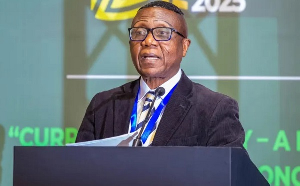Be Prepared To Learn New Things
By Dr. Samuel Adjei Sarfo
A few days ago, Mr. Kwabena Amankwaa, the Editor of the “New Statesman”, Ghana’s oldest newspaper, left a short message on my phone stating, “If you can spare some time, I can create a weekly column in my paper for you”. I was thrilled!
I got to know Mr. Kwabena Amankwaa in the late 1990s on my second stint as English teacher at the SDA Training College, Asokore-Koforidua. In 1989, I was appointed teacher at that college by Mr. Duodu, then principal, after I had completed my three-year studies in Drama and Theater Arts at the University of Ghana, Legon. After another three years at that college, I left for the University of Cape Coast to study for my Bachelors and Masters in English between 1992 and 1997. In 1998, I returned to SDA Training College to continue teaching. My first day in the first year class was when I met Kwabena. That encounter was a near-death experience for my career as an English teacher…….
I was a more confident teacher by now, having performed excellently as a student and Teaching/Research Assistant at the University of Cape Coast; so I entered the class with some air of infallibility and wrote on the board for discussion the essay topic, “Our Role as Teachers in the Upliftment of the Ghanaian Society”. All at once, a hand shot up from the rear of the first row of desks to my right:
“Yes……What is your name young man?”
“Kwabena Amankwaa”
“And what is your problem Kwabena?”
“Sir, there is no word like “upliftment” in the English language!”
“What do you mean…..Of course there is! Bring all the dictionaries in the class.”
Together with the students, I searched through four or five dictionaries without finding “upliftment”. But I found “uplift” which was both the verb and noun form of that lexical item. All of a sudden, it was as if the word had suddenly been expunged from the dictionary by an evil spirit! Feeling already deflated, I explained to the class that language, like living things, is fairly organic, and that words grow into the world of language and die out of it just like we humans. But frankly speaking, I still felt hollow inside of me since I knew that if a word was not found in the dictionary, then it was not in standard or even substandard usage and cannot be introduced in an English language class without an initial caveat. Needless to say, I stumbled through the class with these ominous words ringing incessantly in my ear, “Watch that boy man; watch that boy!”
My second day in that class, I was pontificating about the need for students to be “abreast with” new trends in the language when a hand once more shot up from the rear of the right row, a zone I was now beginning to consider pretty dangerous. I initially pretended not to see, but Kwabena was persistent to the point of ridiculousness, so I gave up and asked:
“What is it again Kwabena?”
“Sir, there is no expression like “abreast with”.
“What?!”
“There is no expression like “abreast with”; so you cannot say, “We must be abreast with new usage.” You should say, ‘We must be abreast of new usage’.”
But by this time, I was aware that my credibility was on life support, and struggling to save whatever was left of it, I stammered incoherently about the teaching task being a two way street, and admitted hurriedly that Kwabena was right….It was a slip of tongue. I had some hereditary intuition then that I might as well not call forth the dictionaries this time around. This was certainly a student who was far ahead of his teacher, and the best approach to deal with such a student was to allow him the leeway to express his ideas in class, no matter how disagreeable.
Later, I became good friends with Kwabena and eventually came to consider him my best student of all time. He also thinks of me as his friend, mentor and teacher although I am not sure I measure up to the two latter accolades. But one thing is for sure: the mere fact that he still holds me in high regard and wants me to be a columnist for his paper means that I did not do badly as his teacher. I also take pride in the fact that Kwabena pursued his passion for writing and retains his voice in the educational and intellectual discourse of our nation.
And as regards this column itself, I invite you to become its regular reader and constructive critic; it should be a serious forum for intellectual discourse, tampered with the lessons Kwabena taught me when I was a young teacher at the SDA Training College: that knowledge is not the exclusive preserve of the esoteric few. By thinking together in humility and mutual respect, we can guide each other and inspire one another in our quest to build a more perfect society.
Samuel Adjei Sarfo, Doctor of Jurisprudence, is a general legal practitioner resident in the city of Austin, Texas, USA. He is now the author of the New Statesman column called “Thoughts of a Native Son”. You can email him at sarfoadjei@yahoo.com.
Opinions of Saturday, 13 September 2014
Columnist: Sarfo, Samuel Adjei














